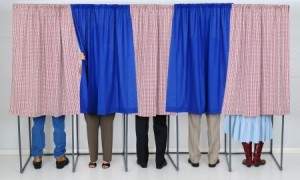What Do Secular Voters Want? Center for Freethought Equality Polls Secular Americans
 Photo by scukrov / 123RF
Photo by scukrov / 123RF Over the past several months, we’ve gotten a sense of how the 2016 presidential elections are shaping up. Well, at least for the primary. We’ve seen the candidates at their podiums giving speeches that feed red meat their bases. We’ve started to see political ads from Super PACs and special interest groups touting their preferred candidate’s record or getting the lead on the negative attacks (which we’ll definitely see more of in the months ahead). And we’ve also borne witness to the presidential debates that have captivated millions of people who want to see if candidates will give brilliant answers to tough policy questions or say something stupid that will go viral online and become the talk of the media pundits.
But have we learned anything about these candidates that would cause a big shift in polling? The data doesn’t reflect this even though there have been some moderate shifts in the public’s favorite at this point. A big argument of the debate structure for the GOP is that there are too many candidates and not enough time on the big stage to get a good idea of what their positons are. The argument on the left is that the Democratic National Committee wants Hillary Clinton to be the nominee and is thus limiting the number of debates while also nudging other candidates to not go too “negative” against her. There are definite merits to both of these arguments, but what is the solution to ensure that voters can truly get to the heart of a candidate’s position on public policy?
One of the solutions could be changing the structure of all debates, especially during the primary season, to single-issue forums. It’s said that this type of political discourse is impossible in our rigid, two-party system that forces individuals into a lesser-of-two-evils decision in many instances. This is a valid argument against two-party systems and in favor of a multi-party system, but I don’t think we’ll see that change anytime soon.
However, single-issue debates would allow both the candidates and the audience to focus more narrowly on important issues rather than skim the surface. Because candidates would have more nuanced and detailed discussions on stage, voters could gain a better understanding on what their positions are on these issues.
But even in this format, there will be some issues that will not be addressed and not receive equal attention. The problem arises when you have millions of single-issue voters who feel that their primary concerns were not addressed in one of these single-issue debates. How will these voters feel when their cause –climate change, or science more broadly, for example, or racial justice for another—isn’t one of the five or ten that can be addressed in a single-issue debate over the course of the presidential campaign?
This issue inspired the Center for Freethought Equality, the political arm of the American Humanist Association, to conduct a survey last month called the “Political Pulse of Secular America.” The purpose of the survey was to help our movement determine not only which presidential candidates the secular community favors but also what issues are most important to us. The goal was to learn more about the secular community’s thoughts and opinions on national politics to be in a better position to advocate for them in the future.
So, was there any consensus from this survey on a particular issue the secular community would advocate to have a single-issue debate around? Let’s look at the results to find out.
The survey was open for responses for twenty-one days and was promoted on social media, blogs, and in email communications, as well as by many different groups, writers, and leaders within the secular movement. In total, 2,242 people responded to the survey. This was not a scientific poll.
Summary of Results
- 58 percent are affiliated with the Democratic Party and 41 percent think of themselves as Independents.
- Of the Independents, 45 percent view themselves as closer to the Democrats while only 2 percent view themselves as closer to Republicans.
- 83 percent are at least very interested in national politics, with 56 percent saying they have contributed money to political candidates or PACs in the past five years.
- 76 percent believe the country is heading in the right direction and approve at least a moderate amount of the job President Barack Obama is doing.
- 74 percent would vote for Bernie Sanders for president if the election were held now, 21 percent for Hillary Clinton, and 2 percent for Donald Trump.
- 35 percent say that the separation of church and state is one of the top three most important issues, but respondents rank this behind economy and jobs, health care, and climate change overall.
- 41 percent believe that science education and research funding is the most important secular issue the next president should address.
It’s very important that people form their own interpretation of what the broader implications of these surveys are, but I think some are clear. For starters, the secular community is not only overwhelmingly supporting Bernie Sanders for president, they are also at least moderately enthusiastic about their choices. Secondly, this is just another piece of evidence that shows how the rise of secular Americans greatly benefits the Democratic Party, a fact that organizations like the Center for Freethought Equality will make sure they’re aware of. Finally, just like every large minority group in this country, the secular community for the most part is not monolithic in the issues we care most about. Sure, we care more about separation of church and state than the average voter, but just like the average voter, we care more about having a job, getting quality healthcare, and ensuring that the our environment is habitable for generations to come.
The full results from the survey can be viewed here.
